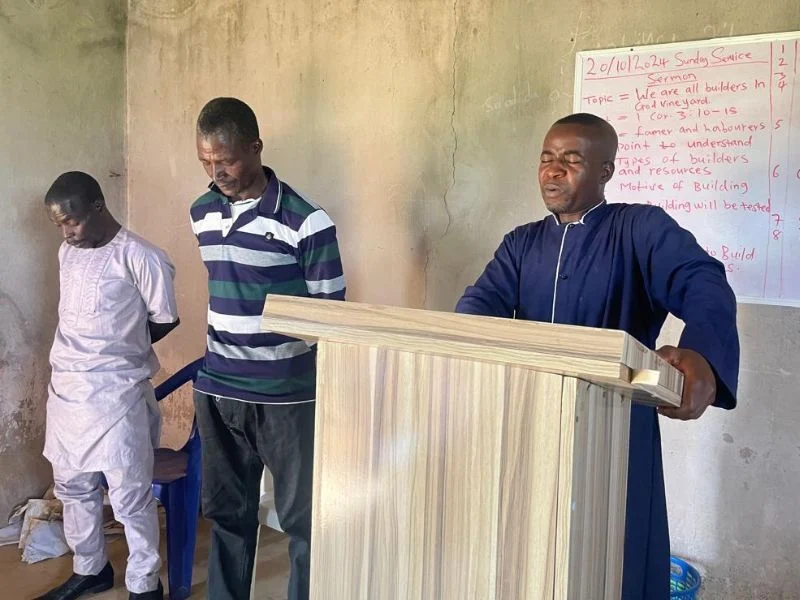May 21, 2025
Reprinted from Baptiststandard.com
Almost daily, news surfaces of Islamic extremists or Fulani militants killing Christians in northern or central Nigeria, with law enforcement either lacking or inadequate to intervene.
Even so, the U.S. Department of State largely failed to pay attention to the religious dimension of violence in Nigeria in recent years.
“The U.S. government has not acknowledged the horrific persecution of millions of Nigeria’s Middle Belt Christians reportedly by Fulani herder militants,” international human rights lawyer Nina Shea told the House Foreign Affairs Subcommittee on Africa at a hearing in March.
She particularly took exception to former Secretary of State Antony Blinken’s testimony before the House Appropriations, stating attacks against Christians in Nigeria “have nothing to do with religion.”
“He overlooked all evidence to the contrary, some of which was included in his own State Department’s International Religious Freedom Report,” she said.
Nigeria’s size, population and underdeveloped infrastructure make full and accurate data on religiously motivated attacks difficult to obtain, U.S. Commission on International Religious Freedom representatives said at a Capitol Hill hearing on religious freedom in Nigeria, but the country is the deadliest in the world for Christians.
About 62,000 Christians have been killed for their faith in Nigeria since the year 2000, Commissioner Vicky Hartzler said, referencing research by Genocide Watch.
In April, more than 240 Christians were massacred in attacks on villages in Plateau and Benue states during Lent and Easter, some as they worshiped, news agencies and religious liberty advocates reported.
‘The attacks are not random
Wissam al-Saliby, president of 21Wilberforce, said Shea “is right to challenge the State Department’s assertion that the violence in Nigeria’s Middle Belt is unrelated to religion.”

Wissam al-Saliby, president of the 21Wilberforce
It is true that multiple factors—such as competition over land, climate change, and ethnic tensions—play a role in the conflict. Violence between herders and framers is a longstanding problem in Nigeria and across Africa,” al-Saliby acknowledged.
“However, we see a clear and consistent pattern to the violence in the Middle Belt: predominantly Christian farming communities are repeatedly targeted by armed groups often identified as Fulani herdsmen, who are largely Muslim,” he added.
“The attacks are not random. They frequently involve the destruction of churches, the slaughter of entire Christian families, and the displacement of thousands of Christian villagers. Survivors and eyewitnesses consistently describe attackers shouting Islamic slogans and targeting Christian symbols and leaders.
“To ignore these religious markers is to ignore the lived reality of the victims and to mischaracterize the ideological motivations of many of the perpetrators.
“Dismissing the religious element also undermines U.S. credibility on issues of international religious freedom, particularly when Nigerian church leaders and civil society organizations are pleading for the global community to recognize the religious persecution their communities are facing.”
U.S. can make a difference in Nigeria
Commissioner Maureen Ferguson told Baptist Press the United States can play a role in driving Nigeria to provide the religious freedom protections the African nation’s constitution stipulates.
Ferguson spoke to Baptist Press on the 22nd birthday of Leah Sharibu, the lone schoolgirl who remains captive among 104 kidnapped on Feb. 19, 2018 by the Islamic State-West Africa Province from a government school in Dapchi, Yobe state. Her captives threatened to hold her as a slave for life because she refused to renounce her faith.
“There is an indication that she’s still alive,” Ferguson said of Sharibu, who was taken at age 14. “I believe she’s borne children in captivity and suffered abuse.”
While Nigeria’s constitution stipulates a respect for religious freedom, the country’s religious landscape defies it. Islamic Shari’a law is enforced in 12 of Nigeria’s northern states, with harsh punishment for blasphemy.
‘People are dying every day’
The government is unable to protect religious groups from violence, particularly in rural areas, USCIRF said, citing banditry and interreligious violence.
Dangerous to Christians are Islamic terrorists, including ISWAP, Boko Haram, militant Fulani and the newly emerging Lakawara.
Violence against Christians, moderate Muslims and minority religious groups is escalating in Nigeria in the meanwhile, USCIRF highlighted in its May 5 hearing on Capitol Hill, offering testimony from commissioners, scholars and political leaders who have long advocated for religious freedom in Africa’s most populous nation.

“People are dying every day. It is getting worse, and it has been going on for years,” said panelist Frank R. Wolf, former USCIRF commissioner and U.S. congressman. “And I’ll tell you, the Christians you meet there, they are amazing.”
Wolf, who has worked alongside Rubio in Congress, believes as does Ferguson that Rubio has a “deep concern about religious freedom.” The new secretary of state would want to do everything possible, Wolf said, to address religious violence in Nigeria.
“The U.S. needs to do something that actually will help prevent further killings of Nigerian Christians and moderate Muslims,” Wolf said.
While some have asserted acknowledging the religious aspect of violence in Nigeria fuels division, al-Saliby of 21Wilberforce insisted it simply is an “accurate diagnosis” of the situation.
“Only by acknowledging the full scope of the problem, including its religious dimensions, can policymakers craft appropriate responses that support vulnerable communities and promote long-term peace and coexistence,” he said.
“The U.S. must take seriously the cries of Nigeria’s Christian communities in the Middle Belt and re-evaluate policies that fail to confront the full reality of religiously motivated violence.”
With additional reporting by Managing Editor Ken Camp.
Caption text: Pastor Eli Abdullahi Tinau, pastor of Evangelical Church Winning All in Nkiendoro, Bassa County, Nigeria, risks his life to share the Gospel with Fulani Muslims amid increasing violence from militant Fulani. International Christian Concern photo

